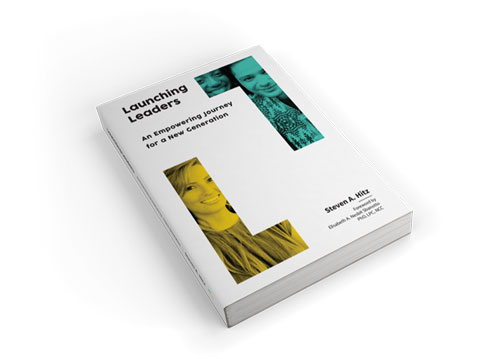
Guest Opinion that Appeared in Deseret News on January 5, 2020
Having hung up my “corporate spurs” a few years ago, I found myself without a company to lead and without a daily mantra to drive my purpose in life. Through the process of shifting my focus away from the corporate labyrinth, where admittedly my purpose was fueled by a certain amount of power and control, I now found my purpose in life was disoriented, swallowed up like a dense fog on a winter morning. I realized that my vocational purpose had consumed many things that really should have been more of my purpose in life, but were lost on my corporate worldview.
Through your life’s journey you may have already experienced the same things my path has revealed. I believe the rising generations have figured this out much sooner that I did. Go ahead and say it millennials, “OK, boomer” … but please indulge me as I know your values are inclusive and not exclusive as to what matters most. I am a boomer, but I claim to have a millennial heart.
What I am about to share regarding my views on purpose are driven by personal experience, which I hope are relevant to you, as I believe I am not the only one who frequently finds a need to review my purpose.
Six points to consider in establishing your purpose:
Purpose is self-directed and intentional
Everyone has a desire to make their own path. No one wants to wake up in the morning and be a foot soldier for causes they aren’t passionate about. No one wants to realize their thoughts and aspirations are being poured into someone else’s mold. Recognition of one’s true identity is a process of self-discovery and is vital to obtaining this self-directed and intentional path toward your purpose. In the bestselling book “Educated,” by Tara Westover, it wasn’t until she was at Cambridge University that an observant professor challenged her pitiful view of herself and said, “You are not fool’s gold, shining only under a particular light. Whomever you become, whatever you make yourself into, that is who you always were. It was always in you. Not in Cambridge. In you. You are gold.”
Sometimes the spark to ignite the purposeful life you desire comes from someone else. The spark can be ignited by a variety of sources, but in the end, grasping on to that spark is intentional — it usually doesn’t happen without seeking the path of purpose.
Purpose is most powerful when coupled with your perceived ‘calling’
I have a Jewish Rabbi friend who has embarked on a “calling” to create a purpose in a Christian faith. He simply felt called by God to do this selfless act of helping a specific Christian faith discover more deeply their roots and appreciate their path to religious freedom. Because he has felt called by God, he is passionate about his purpose in all of this. If we believe that we are serving a higher purpose or even called toward a specific idea regarding purpose, it gives us legs to move forward in powerful ways.
A broad knowledge expands the horizon and possibilities of purpose
The older I get, the thirstier I get for knowledge. Maybe it’s the clock ticking on the last half (or less) of my life. Maybe it’s because I constantly have questions. Maybe I am just eager to figure things out. In the faith world, my questions sometimes alarm my wife and she fears I’m on an exodus from my faith. On the contrary, I’m on a mission to expand my knowledge and push against the filters of my past that may have limited the real view (in my opinion). It’s OK to not understand something, to not agree with someone’s position, to discover and explore points of view different from your own. In doing so, the purpose horizon expands. Why? Perhaps because you haven’t automatically shucked ideas or knowledge aside because you were once programmed to. I’m not saying you should go against your core values — but digging a little deeper into the ideas of another creates bipartisan opportunities if you will, while at the same time lifting the fog of contempt. Expanding your knowledge base is intentional and couples nicely with developing your purpose. Reading a broad spectrum of books, articles and publications on topics you find of interest allows your soul to sift and sort what feels right for you. If you seek knowledge on a continuous — almost daily basis, you will find that you no longer fear the unknown, but embrace the possibilities it creates. As your knowledge expands, so does the focus of your purpose.
Purpose is limited by secularism while pluralism creates the best soil to grow purpose
In other words, not including faith in purpose is a choice (secularism) but believing there is more than one trail to the summit creates different perspectives. There is value in considering the commonality among people, even though they are taking different paths. This paradigm is powerful in creating meaningful purpose. Religious freedom teaches us to see the inherent dignity of each person, and that in so doing, believers and nonbelievers of faith benefit. Deciding to value everyone’s belief system is intentional and leads to more meaningful purpose.
Living in loneliness doesn’t foster purpose
I was lying in bed in the wee hours of the morning the other night, feeling sorry for myself. Mind you, I am in no position to complain about my life, but I’m currently i -between frames — waiting to launch upon another opportunity or chart a little different course. You know the feeling — wondering if the purpose you have pursued is really making a difference, if it fulfills you, and if your life has meaning while considering next steps to bring purpose and fulfillment.
As I contemplated these things for a couple of hours, wide-eyed with the streetlights seeping in through the blinds, I had an epiphany. I was too busy contemplating how my purpose filled me, not how it was filling the lives of others. I shifted gears. Instead of feeling sorry for myself, I started considering deeply the lives of others I knew — especially those who could use an acknowledgement in their lives that they mattered to me. So I got busy writing, mentoring, calling and visiting friends who were too busy to make the same effort, taking food to the shut-ins, listening to those around me without any pretense of what I might say in response — just listening. I decided that my next purpose mantra would be “Do Good Everyday.”
You know what happened? My loneliness was lifted and I realized my purpose must focus on others more than myself. Everything I’ve ever known told me this — but I needed to experience this again in order to see through my selfish lens a purpose that mattered to others more than me. Much has been written about this, but taking a little time in our lonely state to move our energy from our little island to the great ocean of possibilities — of how others might be blessed through us — is a wonderful way to find and discover purpose; not to mention the great medicine it is for loneliness and depression.
Establishing purpose requires time to reflect
Gen. James Mattis, who spent a lifetime in the Marines, overseeing many critical and sensitive wars and conflicts (including leading U.S. Central Command) determined the single biggest deficiency in decision-making was a lack of time. The demands of our jobs, homes, school and a thousand other things make us so busy we don’t find the time to reflect. In his book, “Call Sign CHAOS,” Gen. Mattis noted that when he took the time to reflect, he could ask himself questions like “Where was our strategy lacking?” or “What lay over the horizon?” He said he spent enormous amounts of time discovering what the troops needed and where their heads were at by visiting them personally. He determined that to establish trust in the ranks, you couldn’t achieve it by email.
Interesting isn’t it? Like Gen. Mattis, we also need to find time to reflect and to put relationship development at the top of our list to find and establish our purpose.
I believe there is a real need to discover and rediscover our purpose in life. Finding and establishing purpose is a dynamic event that can be revisited as often as needed. Certainly doing so helps ward off many of today’s challenges of angst, anxiety and depression as they are replaced with introspection that brings peace, hope and fulfillment.
Steve Hitz is a co-founder of Launching Leaders Worldwide www.llworldwide.org, a nonprofit organization that provides young adults with tools for personal leadership and faith.





